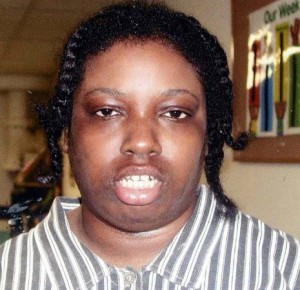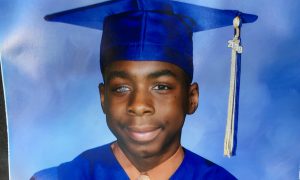IF CHRISTINA SANKEY had been an angel-faced toddler when she went missing, we might know by now how she wound up dead, half-naked and alone, between two parked cars in West Philly on a frigid winter morning.
The city would’ve been galvanized by her death. Government officials would’ve promised to find out how she met her tragic end. Someone would’ve created a sidewalk memorial, and others would’ve led prayer vigils to honor the life that was lost.
But Christina, 37, had the mentality of a 2-year-old, but not the physique. She was a 5-foot-tall, 160-pound severely autistic and intellectually disabled woman. She was well cared for by her family, but ungainly. And she would grunt in ways that are precious in babies but odd in adults.
She was also poor. Her mother, Patricia Sankey, with whom she lived, hasn’t the resources nor clout to make a big deal out of her daughter’s passing.
And that, I fear, is why the death of this terribly vulnerable woman-child has not even registered on the public’s radar. Christina just wasn’t adorable enough or from the right circumstances for her death to warrant the attention it deserves.
Christina was last seen alive on March 6 inside Macy’s, at 13th and Market, while under the care of her state-paid caretaker, Hussanatu “Ayesha” Wulu, 29.
Wulu lost track of her. Christina’s body was discovered the next morning on 57th Street near Master, 5 miles away. She couldn’t have gotten there by bus or train, Sankey says, since she was nonverbal and incapable of using public transit alone. Nor does Sankey believe Christina would’ve walked that far.
So how did Christina get there? And does anyone other than her mother think that’s an important question to ask?
“I have nothing to say to anyone,” Wulu said when I visited her Southwest Philly home. As I drove away from the house, a man who identified himself as Alie Barrie, the home’s owner, cut me off with his van and angrily told me to leave his family alone.
Chetachi Dunkley-Ecton won’t talk, either. She is CEO of Casmir Care Services Inc., which employed Wulu and assigned her to provide Christina with seven hours a day of monitored supervision.
I wanted to ask Dunkley-Ecton why Wulu was shopping in a bustling Center City department store with Christina in the first place. Sankey insists that her daughter – whose favorite activity was rolling a ball – had no capability to learn shopping skills and no reason to be there.
I also wanted to speak with John F. White Jr., president of The Consortium Inc. That’s the agency that coordinated the services Christina received through Casmir Care. If he’d responded to messages I left for him, perhaps he would’ve expressed condolences for Christina’s death.
At least Philadelphia police are willing to acknowledge her demise, which a spokesman says “does not appear suspicious,” even though the Philadelphia Medical Examiner’s Office has not yet issued an official cause of death. Off the record, a police source says Christina likely died of hypothermia – she froze to death – a condition that can scramble the brain’s ability to discern body temperature.
“People who die of cold exposure often feel hot and remove their clothes,” the source said, and that’s why he suspects Christina was topless when she was found.
Except, says Patricia Sankey, her daughter hadn’t the ability to remove the pullover top she was wearing the day she disappeared. Sankey would’ve told detectives as much, but no one has spoken with her since she identified Christina at the city morgue.
It doesn’t appear that anyone from the District Attorney’s Office will speak with her, either.
“Unless her death is ruled suspicious, we wouldn’t be involved because a crime wasn’t committed,” D.A. spokeswoman Tasha Jamerson says.
Call me prickly, but allow me to recall the scorching heat of July 24, 2010. On that day, a severely autistic young man named Bryan Nevins baked to death inside the van of his Bucks County caretaker, Stacey Strauss. Court records later showed that Strauss was texting and talking with her boyfriend while Nevins died. Strauss was convicted of and jailed for involuntary manslaughter.
Sankey would like to know what Wulu’s state of mind was the day Christina went missing. That morning, she says, while Wulu was in the Sankey home, the doorbell rang. It was Wulu’s husband, who summoned Wulu outside, where the two had a “loud disagreement.”
“Afterward, she acted very odd,” Sankey says. “She said to Christina, ‘We’re leaving.’ That’s the last I saw of my baby.”
Regardless of the cause of Christina’s death, doesn’t it at least warrant a look-see from the D.A.? Given that Wulu’s only job was to provide monitored supervision to Christina? Especially in public, unsecured places?
The one person in an official capacity who seems to grasp the horror of this mess is Arthur Evans, commissioner of the city’s Department of Behavioral Health and Intellectual disAbility Services. (The department makes sure that local agencies like Casmir Care are qualified to provide state-mandated services in Philadelphia.)
“Like all Philadelphians, we were shocked and saddened to learn of Christina’s tragic and untimely passing,” Evans said in a statement Tuesday – issued a full two weeks after I requested comment from his department. “At DBHIDS, that shock and sadness remains today as we wait to receive crucial reports from the Medical Examiner’s Office and other offices to complete our investigation. We will continue to support the commonwealth to provide them with the information they require to decide what next [steps] are appropriate.”
His concern is too little, too late for Christina’s mother.
“No one cares about my daughter. She was poor, she was disabled. She was not going to set the world on fire. But she was my world,” said Sankey, who lives with her younger daughter, Eliza – also mentally disabled – in Point Breeze. Sankey is by turns fiery and weepy, twisting tissues in her hands as she talks about the daughter she describes as “the most loving child. She would hug you all the time. When she was sick, she would let you know by laying on top of you.”
Christina enjoyed watching old Westerns like “How the West Was Won” and reruns of “Gunsmoke” . . . she loved their old-timey sound tracks. She knew it was lunchtime when the “Judge Mathis” TV show ended. She craved morning coffee and cheese curls. And she was a proud graduate of Furness High School’s special-ed program.
“My hope was that she would learn to print her own name, but she would forget the letters as soon as she wrote them,” Sankey says.
She takes a breath and stares at the red-and-white urn that holds her daughter’s ashes. She says that she talks to the urn every night and apologizes for what happened.
She would talk to Christina’s photos, too, except she gave the best ones to people from Casmir Care when Christina went missing, so they could show them to Macy’s shoppers in hopes of finding her.
On Sankey’s behalf, I drove to Casmir Care, on Parkside Avenue near 49th Street, to retrieve the photos for her. A receptionist referred me, instead, to the agency’s lawyer.
Sankey deserves a more caring response than that. And so does her daughter.
Source: Articlesphilly.com
[AdSense-B]

















































































































































































































































![[Video] Chicago Police Officers Caught On Video Telling Two Black Men "We Kill Mother F**kers"](https://earhustle411.com/wp-content/uploads/2018/07/evil-cop-3-300x180.jpg)
![[Video] Chicago Police Officers Caught On Video Telling Two Black Men "We Kill Mother F**kers"](https://earhustle411.com/wp-content/uploads/2018/07/evil-cop-3-80x80.jpg)












![[Video] White Woman Calls The Cops On Black Real Estate Investor, Cops Threaten To Arrest Her For Harassing Him](https://earhustle411.com/wp-content/uploads/2018/05/nosy-neighbor-300x180.png)
![[Video] White Woman Calls The Cops On Black Real Estate Investor, Cops Threaten To Arrest Her For Harassing Him](https://earhustle411.com/wp-content/uploads/2018/05/nosy-neighbor-80x80.png)


![White Scientist Says The Black Community Is Being Targeted By The Medical System, They Are Deliberatly Being Poisoned [Video]](https://earhustle411.com/wp-content/uploads/2016/05/mike-adams-300x180.jpg)
![White Scientist Says The Black Community Is Being Targeted By The Medical System, They Are Deliberatly Being Poisoned [Video]](https://earhustle411.com/wp-content/uploads/2016/05/mike-adams-80x80.jpg)








![Teenage Girl Shot In Her Stomach Three Times But Took Time To Post To Facebook [ Video]](https://earhustle411.com/wp-content/uploads/2016/02/Gangster-chick-300x180.jpg)
![Teenage Girl Shot In Her Stomach Three Times But Took Time To Post To Facebook [ Video]](https://earhustle411.com/wp-content/uploads/2016/02/Gangster-chick-80x80.jpg)







